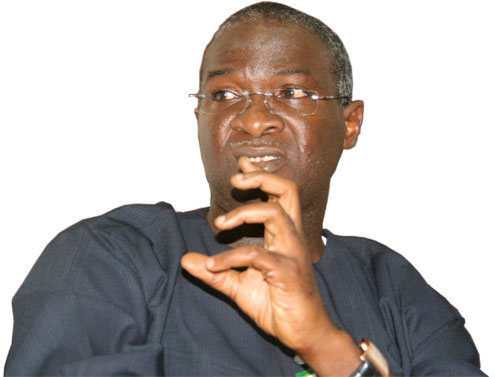
At a time many Nigerians are questioning the Minister of Power, Works
and Housing, Babatunde Fashola’s ability to rejuvenate the power
sector, the Minister has on Friday May 6, reeled out his successes.
Post-Nigeria had earlier reported that under his watch, Nigeria made his history by generating zero megawatt of electricity.
Within the last four weeks, the nation has suffered 4 consecutive
system failure, with Nigerians perpetually kept in darkness, while
companies and industries spend more to produce, which has contributed to
high inflation figures.
Fashola, while delivering a public lecture tagged, ’Nigeria’s
Electricity Challenge: A Roadmap for Change,’ in Lagos, noted that the
country has 26 power plants, with three powered by water in Jebba,
Kainji and Shiroro, while the rest of the plants are powered by gas.
According to him, the country has 140 turbines with installed
capacity of 12,341 megawatts, adding that at the best of times, only
about 78 turbines generate power, which had resulted in February 2, 2016
peak of 5,074 MW.
He said, “The problems have been identified as either damaged,
unmaintained or unserviced turbines in the hydro power plants, and in
the cases of gas plants, it is largely non-availability of gas, coupled
with lack of maintenance.”
He disclosed that Jebba Hydro power plant, which was commissioned in
1985 by President Muhammadu Buhari, with six turbines to provide 540MW
of power, has been overhauled which will add to the national grid.
Jebba and Kainji, have the capacity to generate a total of 482 MW and 340 MW respectively totaling 822 MW.
He described the plan by the investors to boost the generation to 1338 MW as incremental power.
He added, that the Egbin Power plant in Ikorodu, which had 6
turbines with only 2 functional, has been restored with a total capacity
of 1,320 MW.
He said, “I was at the plant in December 2015, to switch on Turbine 6, which means all the 6 turbines have been restored.
“This is incremental power. But these are just examples of the maintenance and technical challenges we grapple with daily in the government from the President, to the Vice President, and the Ministry, which seek to manage the men and women”.
On Azura power project in Edo state, he said, it was the Buhari’s
administration that prioritised the project meant to deliver 450
Megawatts.
He said, ”It was the Buhari administration that prioritised this,
resolved it, and work has now started with 422 workers on site and
estimated completion date of December 2018. This is the road to
incremental power,” he added.
Speaking on Aba Power plant initiated by Prof. Barth Nnaji, to
generate 140 MW and the Enugu DisCos long row, the minister noted that
none of the two parties should be blamed as both of them had legitimate
contracts, which were conflicting and issued by the same government.
He said,”Instead of spending their energy and resources completing
the power plants and delivering electricity, they were forced to spend
their resources and energy seeking to untie themselves from the problems
created by government since 2013.
“This government has waded into the matter, and through the Vice President, directed our ministry to facilitate reconciliation, and with the cooperation of the parties, their sense of patriotism, we got the parties out-of-court in a settlement three years after.
“We are now formalising their papers so that they can operate independently and collaborate to supply power to Aba and Enugu Distribution that covers most of the East instead of fighting in court.
“Solving the problems of yesterday is the road to incremental power,” Fashola explained.
On Zungeru Power Plant, meant to deliver 700 MW in Niger state, the saga has been held up in court for several years.
He said, “Although the project is now three years behind, the dispute
has been resolved, parties are out of court, over 800 workers are back
on site and this should deliver incremental power”, Fashola said.













0 Comments:
Post a Comment